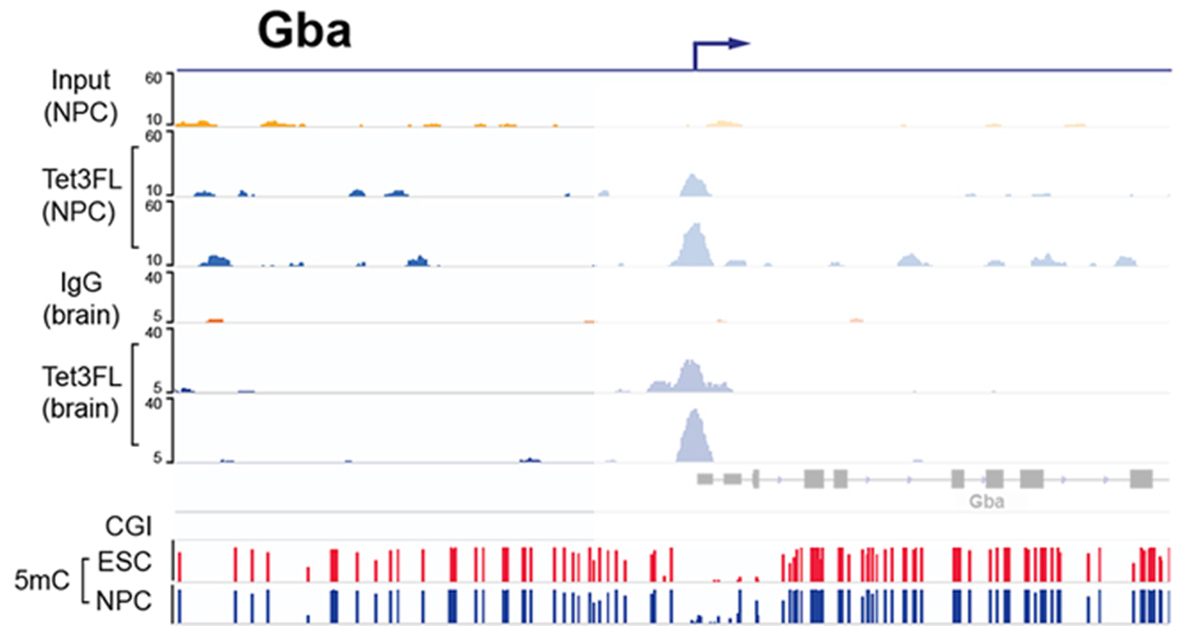Scientists identify potential “guardian” against neurodegeneration
January 25, 2016

GRAND RAPIDS, Mich. (Jan. 26, 2016)—Stopping disruptions in cellular “trash removal” brought on by errors in molecular marks on DNA may guard against neurodegenerative diseases like Parkinson’s.
Novel findings from a team led by Van Andel Research Institute (VARI) Professor Gerd Pfeifer, Ph.D., implicate certain epigenetic modifications—marks on the DNA that affect gene regulation without changing the genetic code—in the development of some neurodegenerative diseases. His team has demonstrated how a protein called Tet3FL removes molecules called methyl groups from specific genes, keeping them active and the “trash removal” processes working. Without these vital housekeeping functions, abnormal proteins and other cellular waste can accumulate and cause damage.
“When we looked at the data, Tet3FL was surprisingly specific—we found a relatively small number of genes associated with it, the majority of which are part of the lysosomal and autophagic pathways,” Pfeifer said. “These pathways are responsible for clearing out old and damaged proteins and other cellular components, and have been previously linked to neurodegenerative diseases. Importantly, mutations in one of these genes, GBA, are recognized as the strongest genetic risk factors for developing Parkinson’s. Knowing how these genes are regulated, especially genes like GBA, could help us develop novel treatments for neurodegenerative diseases.”
Brain cells are largely non-dividing, meaning a person has essentially the same set for their entire life while other cells, like skin cells, turn over frequently. When epigenetic marks, such as methyl groups, are inappropriately added to DNA in cells that frequently divide, the negative effect is usually diluted out by removal of these marks during cellular division. However, in non-dividing cells (a group that includes most nerve cells in the brain) the effects of a gene being switched off due to improper methylation can be more profound. This is where Tet3FL comes in—it stays close to a specific site on particular genes and removes methyl groups as needed, maintaining the functionality of those genes and, in effect, potentially acting as a “guardian” against neurodegenerative diseases.
Pfeifer plans to collaborate with other scientists at the Institute, including renowned neuroscientist and Parkinson’s expert Patrik Brundin, M.D., Ph.D., to further explore how Tet3FL may provide protection against neurodegenerative diseases.
“These findings open a new avenue to explore potential new ways to prevent and treat diseases like Parkinson’s,” Brundin said. “I look forward to working with Dr. Pfeifer to further explore how this mechanism could be harnessed to develop new targeted therapies to dramatically improve the quality of life for people with these diseases.”
The study was published in Cell Reports with VARI’s Seung-Gi Jin, Ph.D., as first author. It was conducted in collaboration with VARI’s Piroska E. Szabó, Ph.D., and scientists at Beckman Research Institute of the City of Hope; University of California, Riverside; and the State Key Laboratory of Molecular Biology at the Chinese Academy of Sciences.
###
Jin SG, Zhang ZM, Dunwell TL, Harter MR, Wu X, Johnson J, Li Z, Liu J, Szabó PE, Lu Q, Xu GL, Song J, Pfeifer GP. 2016. Tet3 reads 5-carboxylcytosine through its CXXC domain and is a potential guardian against neurodegeneration. Cell Rep.
ABOUT VAN ANDEL RESEARCH INSTITUTE
Van Andel Institute (VAI) is an independent nonprofit biomedical research and science education organization committed to improving the health and enhancing the lives of current and future generations. Established by Jay and Betty Van Andel in 1996 in Grand Rapids, Michigan, VAI has grown into a premier research and educational institution that supports the work of more than 330 scientists, educators and staff. Van Andel Research Institute (VARI), VAI’s research division, is dedicated to determining the epigenetic, genetic, molecular and cellular origins of cancer, Parkinson’s and other diseases and translating those findings into effective therapies. The Institute’s scientists work in onsite laboratories and participate in collaborative partnerships that span the globe. Learn more about Van Andel Institute or donate by visiting www.vai.org. 100% To Research, Discovery & Hope®
